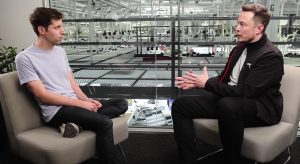Peter is a Partner in the Forensic Technology practice at Deloitte UK and runs their eDiscovery business. He has been with the firm for 19 years and has seen the Forensic Technology team grow from just two people in London to 150 people across four separate sites in the UK during that period. He has worked on many of the highest profile regulatory, litigation and investigation matters in the UK and across many other jurisdictions around the globe. During his career, Peter has seen Forensic Technology go from being a niche, rarely utilised service to the vital driving force behind Deloitte’s entire Forensic Accounting and Investigations practice. He discusses the ways in which he is seeing technology an AI affect corporate bodies and lawyers; he also touches on how computer forensics help during investigations, and how being ahead of the legal game now requires professionals to thoroughly embrace technology.
What has been the biggest challenge you have faced in order to be as established as you are now? What advice would you offer aspiring lawyers, in order to help them overcome potential hurdles?
When I started in the industry the technology team was very much viewed as being a support function for the lawyers and forensic accountants that was only engaged when all other, more manual, approaches had been exhausted. That has changed over recent years to the extent that the more forward-thinking firms have the technology team working right alongside the other professionals, often from day one of a matter, advising them on their approach in order to get to the heart of the issue as quickly as possible.
For aspiring lawyers, I would say that having a deep understanding of the latest technology can help you differentiate yourself from your peers and give you a step up in your career. In fact, I would say that it will soon be essential for effective legal counsel to be conversant with the latest cognitive technologies that enable them to quickly analyse and derive value from their client’s data. It is clear that technology will help the more advanced corporate clients move from a state of event ‘detection’ to ‘prediction’, and as such the role of the client’s lawyers will also change in its nature.
What was your main motivation behind specialising in the legal sector?
From my university days, I have always been fascinated by the investigative world, particularly large corporate frauds. There was always an interplay between business, regulators and government that showed how the world really works behind the scenes. It was only later on that I realised that the power of technology could not only help to understand these phenomenally complex issues, but could also dramatically reduce the associated timescales and costs. While confidentiality precludes me from discussing my work, it is immensely satisfying to see many major matters being discussed in the press and on television and to think that it is our teams that have helped clients to address those important issues.
How have you seen the development of technology assist you in your role over the years?
In the early years forensic technology really was a cottage industry with many clever amateurs writing software to help our work. It was such a niche play that no large corporates were involved in. That has changed a lot over the past 10 years and the eDiscovery industry is now at the forefront of the practical use of machine learning and AI. We have already seen analytic technologies significantly reduce the levels of human input required in disciplines, such as document review, and its impact will be even more profound in the years to come. We see clients on all points of the maturity curve in terms of their use of technology to manage potential issues in their businesses. At the high-end we are seeing clients whose aspiration is to leverage analytics to predict potential issues (be it fraud, corruption or other conduct issues) before they occur. While we are many years away from the world of ‘Minority Report’ it is clear that predictive technologies will play a massive role in mitigating the risks of the future.
Moreover, what developments are you looking forward to witnessing in the new future? How will this affect your role?
Even though we’re at the forefront of what is happening around AI, I think we’re only at the beginning of this process. I think the next five years will see a revolution in how legal and regulatory matters are dealt with from a data perspective, with far reaching consequences for the legal and adjacent professions (such as forensic accounting). An exciting model for professional services firms of the future could offer clients value by bringing together the finest minds in the technology, legal, investigative and regulatory space under one roof. We will continue to see the more ‘process’ elements of legal practice being accelerated / replaced by cognitive technologies; already we have seen document review and contract analysis tasks being significantly automated by the effective use of machine learning and AI technologies.
What is the main challenge when leading teams during investigations using technology? How have you developed your expertise over the years to overcome the challenge?
Performing eDiscovery work on data with which you are familiar is hard enough but new projects always present specific data challenges regarding that industry. An example was the investigations into the manipulation of LIBOR and FOREX, where the collection and analysis of audio and instant messaging traffic was first undertaken on what I might call an industrial scale. Each manufacturer has production systems out of which data needs to be extracted and analysed. Therefore, you need to build a multi-disciplined team that has the skills to develop solutions and not just rely on off-the-shelf software. It also helps to have the world’s largest IT consulting practice sitting behind you for industry specific input and expertise. Working on matters overseas has presented significant data protection / privacy challenges and it is vital to have a clear understanding of local regulation and cultural considerations.
In what ways does computer forensics help during investigations and litigation?
Sometimes you have to leave no stone unturned in order to find the whole truth; this is particularly true if matters could turn criminal. There are also particular types of investigation or types of industry where computer forensic skills are needed. One example would be intellectual property theft where the protagonists are usually very careful in their attempts to cover their tracks. Another area which has grown rapidly over the past five years is cyber investigations; we have a crack team of cyber investigation specialists but sometimes this team finds itself up against highly skilled and highly motivated attackers and this can be a challenge to the very best.
What would you claim is key to being successful in your role?
It is a cliché but it is true: I try to surround myself with the best people and I listen to them. At the end of the day I have to make many of the key decisions, but I always feel that I am doing it on the back of a very informed debate with some of the brightest people in the industry. I am also lucky enough to be constantly inspired and motivated by the enthusiasm and creativity of the graduates who join our practice every year.
What is the most favourite aspect of your job, and why?
Our graduate programme is around six years old now and every year we take around 20 of the brightest technology graduates into our team. Watching the contribution these people have made to the team over the years has been phenomenal. I’m sure that one of them will be my boss one day. It might be sooner than I think. More generally, I am truly grateful for having the opportunity to spend every working day with a diverse team of creative, hardworking and innovative individuals who constantly impress me with their commitment to the firm and to our clients.
Is there anything else you would like to add?
We spend a considerable amount of time educating lawyers and accountants in how technology can assist them to arrive at speedy and cost-effective conclusions to their matters. I would urge any newly qualified lawyer or forensic accountant to take the time to develop their knowledge of how technology is a now fundamental tool of their trade.
Peter Robinson
Partner
petrobinson@deloitte.co.uk
+44 (0)20 7303 2148
Athene Place
66 Shoe Lane
London
United Kingdom
EC4A 3BQ
www.deloitte.com
Peter leads Deloitte’s Electronic Discovery function in the UK. He has 18 years’ experience in helping clients marshal their data in response to legal, regulatory and investigative issues. Peter is also part of the leadership team in Deloitte Analytics, specializing in Information Management. Throughout his career Peter has led teams employing all the primary methods by which technology is used in investigations and dispute resolution.
“Deloitte” is the brand under which tens of thousands of dedicated professionals in independent firms throughout the world collaborate to provide audit, consulting, financial advisory, risk management, tax, and related services to select clients. These firms are members of Deloitte Touche Tohmatsu Limited, a UK private company limited by guarantee (“DTTL”). Each DTTL member firm provides services in particular geographic areas and is subject to the laws and professional regulations of the particular country or countries in which it operates.




















